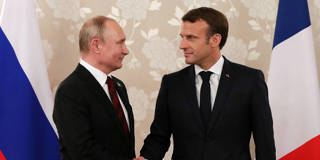OnPoint Subscriber Exclusive
The Big Picture brings together a range of PS commentaries to give readers a comprehensive understanding of topics in the news – and the deeper issues driving the news. The Big Question features concise contributor analysis and predictions on timely topics.

To Russia With Love
French President Emmanuel Macron’s recent overtures to Russia have been described as both highly aspirational and deeply pragmatic. Whatever the case, much diplomatic and political wrangling will be needed to restore Russia to a position of good standing vis-à-vis the West.
In this Big Picture, Mark Leonard of the European Council on Foreign Relations explains the French government’s thinking, and notes that success will depend on its ability to get all Europeans on board. And as Dominique Moisi of Sciences Po contends, there is little reason not to give Macron’s initiative a shot, given that the current Western strategy of containment has clearly failed. But Joschka Fischer, a former German foreign minister, disagrees, arguing that more divides Europe and Russia than mere politics. And as former Spanish foreign minister Ana Palacio warns, Europe will have to be mindful of Russia's renewed sources of strength when shaping its own diplomatic strategy.
Reflecting on the Kremlin’s perspective, Carnegie Moscow’s Alexander Gabuev and Elena Chernenko of Kommersant Publishing House argue that Russian President Vladimir Putin will participate in multilateral efforts only in cases where he has skin in the game. But, as former Swedish Prime Minister Carl Bildt points out, the broader Russian elite sees little other strategic choice but to turn back toward the West at some point.